This flavor-packed Greek shrimp recipe (shrimp saganaki) comes together in 30 minutes or less! Cook up some shrimp in a tasty chunky tomato sauce with spices, fresh herbs, garlic, and a splash of lemon juice before finishing it off with some creamy crumbled feta cheese.
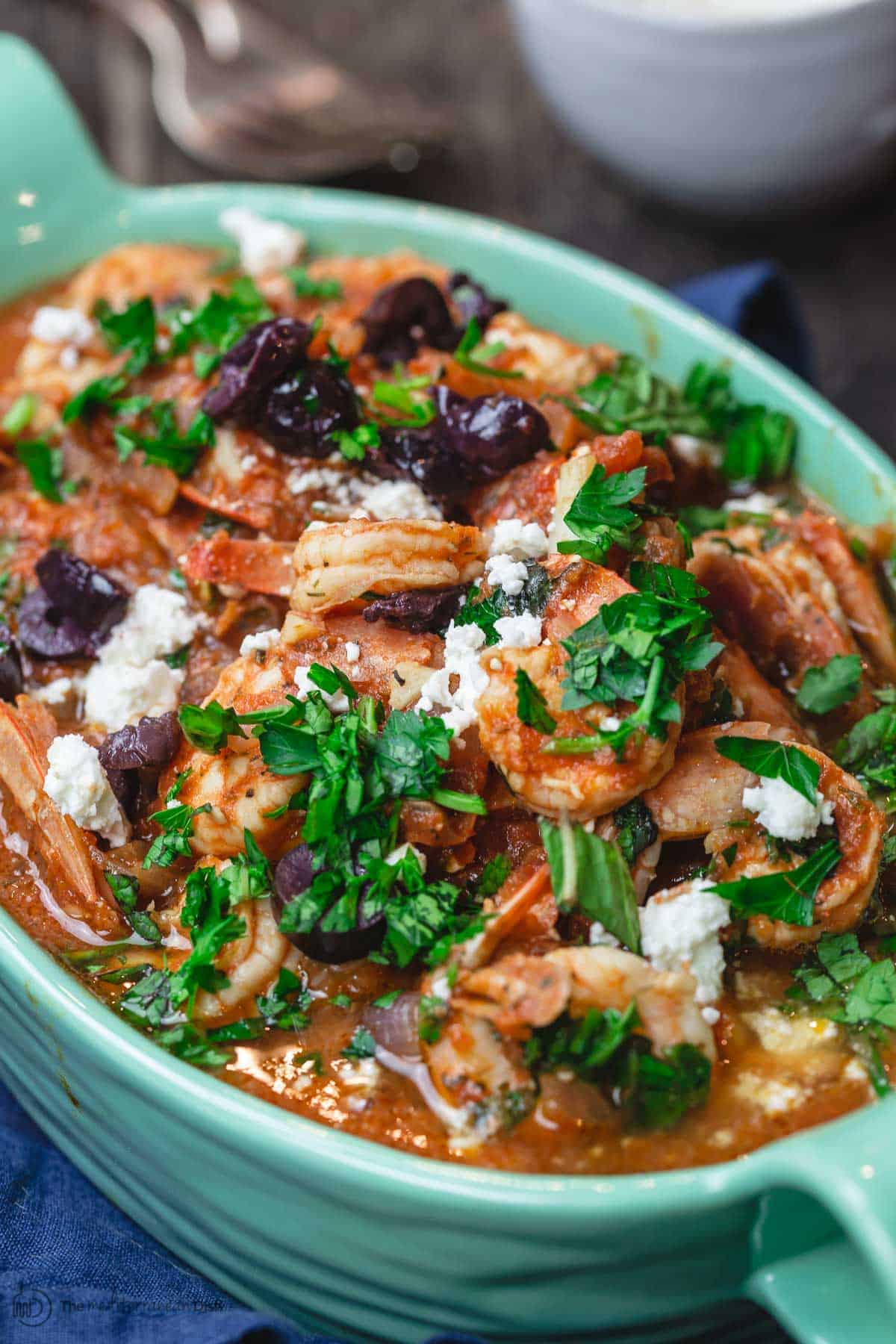
Shrimp is one of the prized Mediterranean ingredients that you can turn into a delicious dinner in just a few minutes!
From soups, to pasta, and kabobs, these plump little morsels amp up the “fancy” factor with very little effort. And if you’re anything like me and love bold Greek flavors, you’ll want to give this shrimp saganaki a try ASAP!
Greek shrimp with tomato sauce is hearty, bright, and packed with flavor from garlic, fresh herbs, olive oil, and lemon juice. Crumbled creamy feta cheese and handfuls of fresh herbs finish the dish beautifully.
Start by marinating the shrimp briefly, and let them sit while you work on the addictive tomato sauce. When the sauce is ready, toss the shrimp in to cook (this will take mere minutes), and there you have it! A 30-minute dinner elegant enough to serve guests, but also quick enough for any night of the week!
Table of Contents
What is shrimp saganaki?
Saganaki refers to a variety of Greek foods cooked in a small two-handled frying pan. The most popular saganaki dish is feta saganaki, where feta cheese is fried until softened and drizzled with honey.
In Greece, you can find shrimp saganaki on most menus. It’s a beloved summer dish, usually served as mezze with a boozy beverage like ouzo (anise-flavored Greek liquor) or white wine.
Not only is ouzo often served with shrimp saganaki, it is also usually included in the recipe! Because I didn’t have any on hand, I opted to leave it out – trust me, you won’t compromise any of the flavor!
If you do have ouzo, add ¼ cup to the skillet along with the tomatoes. And, while you’re at it, why not whip up a quick ouzo cocktail to sip on while you cook?

How to buy shrimp
Fresh or frozen shrimp would work in this recipe, and I’m going to give you some tips for buying shrimp, from how to tell whether shrimp is good to deciphering the various sizes of shrimp.
If you’re buying fresh shrimp, there are a couple of things to look for:
- Shrimp should be displayed on a thick bed of ice, with some sort of cover. This keeps the shrimp from spoiling.
- Fresh shrimp should have little to no odor. If the shrimp has a strong or unpleasant smell, avoid it.
Frozen shrimp should come in a completely sealed bag. If the bag is damaged in any way, do not purchase it. In addition, frozen shrimp should be solid. If it can bend, it is likely thawed or thawing out. If there are ice crystals on the packaging, that can indicate that the shrimp is freezer-burnt.
Now, onto size. For this recipe, I recommend large or jumbo shrimp. But what does that mean? The size of shrimp is determined by how many shrimp it takes to make up a pound. In simple terms, the higher the number of shrimp per pound, the smaller the shrimp.
At the grocery store, you will see shrimp of various sizes, with numbers on the packaging like “21/25”. This means there are 21 to 25 shrimp in a pound. Here’s more information about the sizes of shrimp:
- Small: 51/60
- Medium: 41/50
- Large: 31/35
- Jumbo: 21/25
- Colossal: 13/15
Shrimp saganaki is best made with larger shrimp because you want them to stay plump and juicy as they cook, which can be difficult when they are too small. So look for shrimp that’s either labeled “31/35” or “21/25”.
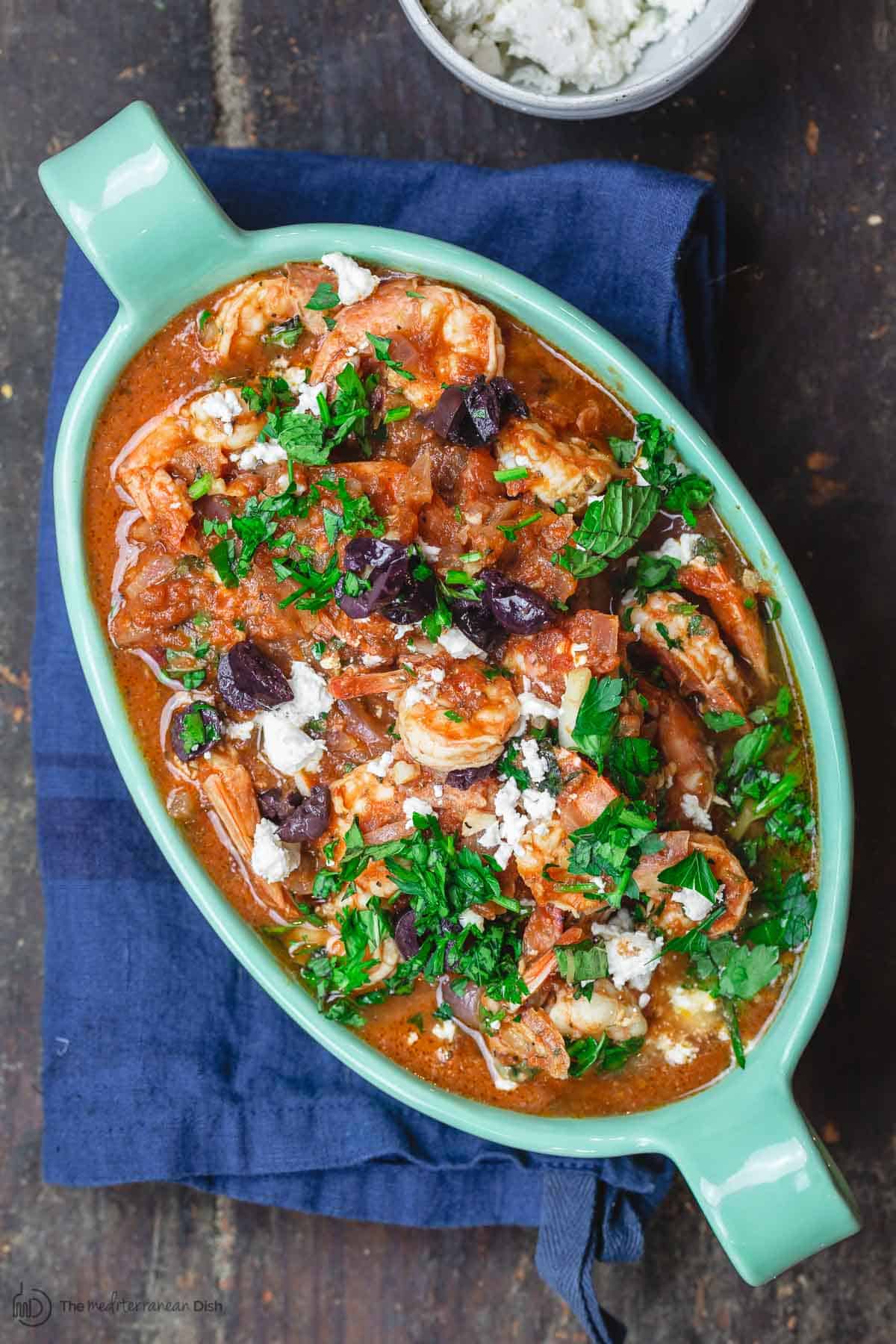
How to peel and devein shrimp
While I love the ease of a bag of peeled and deveined shrimp, shell-on shrimp is definitely the more cost-effective option. And while cleaning shrimp can seem intimidating, it’s actually quite simple! All you need is a little time. Here’s how:
- Remove the head (if still attached) by locating the point where the head meets the body, and slicing it off with a sharp knife.
- Then, pull off the legs.
- Next, starting from the head side of the shrimp, peel away the segmented shell, which should be easy once the legs are removed. I like to leave the tail on, but you can remove that as well if you like. You can freeze the shells to use later – they make a fantastic seafood stock!
- Deveining the shrimp is really a matter of personal preference. The vein won’t harm you if you eat it, but it can taste bitter or have a sandy texture. To remove it, use a small, sharp knife (like a paring knife) to make a cut along the outer side of the shrimp. You should be able to see the vein (it is thin and black). Simply remove it with the knife and discard. Rinse the shrimp well with cold water.
For more great tips about working with shrimp be sure to check out our Guide to Buying and Cooking Shrimp.
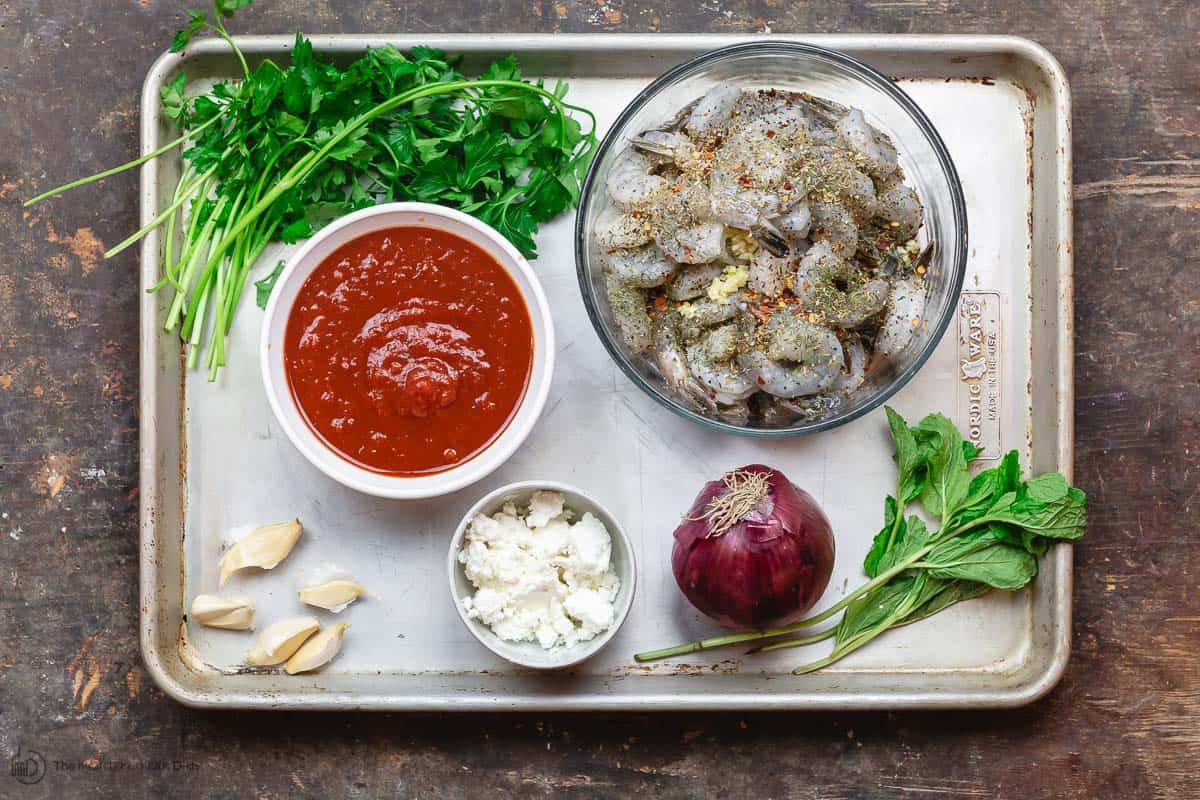
Ingredients for Greek shrimp
Shrimp saganaki is full of bold flavors from fresh and dried herbs, good extra virgin olive oil, and lemon juice. Here’s everything you need to make it:
- Shrimp: You need 1 ½ pounds of large or jumbo shrimp, peeled and deveined.
- Seasonings: Dried oregano, dried dill weed, red pepper flakes (optional), and garlic.
- Extra virgin olive oil: A Greek EVOO like our Early Harvest is a good option here, because it has a robust, peppery flavor that will enhance the dish.
- Red onion: You can use a yellow onion instead, if you don’t have red onions.
- Tomatoes: I used a 26-ounce can of diced tomato with a bit of the liquid drained. If you would prefer, you can use about 10 fresh Roma tomatoes.
- Fresh lemon juice: Juice ½ a lemon, but reserve the other half to add more at the end if you want more acidity.
- Fresh herbs: I used fresh mint and Italian parsley, but you can use dill or cilantro, too!
- (Optional) Feta cheese: I like to crumble 2 to 3 ounces of feta cheese, straight from the block in the brine. The pre-crumbled stuff is always too dry.
- (Optional) Kalamata olives: Don’t like olives? No problem! Leave them out.
How to make shrimp saganaki
Because shrimp cooks so quickly, this saganaki dish comes together in 30 minutes or less. And, if you use peeled and deveined shrimp, prep is minimal! Here’s how to make it:
- Marinate the shrimp. Pat dry 1 ½ pounds large or jumbo peeled and deveined shrimp. Place them into a large bowl. Season with kosher salt and black pepper, as well as ½ teaspoon each dry dill weed, dried oregano, red pepper flakes, and minced garlic. Drizzle with extra virgin olive oil, toss, and set aside.
- Make the tomato sauce. If you do not have a traditional saganaki cooking dish, just grab a large cast-iron skillet. Heat a couple of tablespoons EVOO over medium heat, and add 1 chopped red onion and more minced garlic. Cook until fragrant. Add a 26-ounce can of diced tomatoes (drain out some of the liquid so the dish does not turn out watery), the juice of ½ a lemon, and a teaspoon each of dried oregano and dill weed. Bring to a boil then reduce the heat to medium-low. Allow the sauce to simmer for 15 minutes.
- Cook the shrimp. Add the marinated shrimp to the skillet with the tomatoes and cook for 5 to 7 minutes until just pink.
- Add finishing touches. Stir in a handful each of chopped fresh mint and flat-leaf parsley. Then sprinkle some feta and chopped Kalamata olives on top. If you like, you can add a splash more lemon juice before serving Greek shrimp.
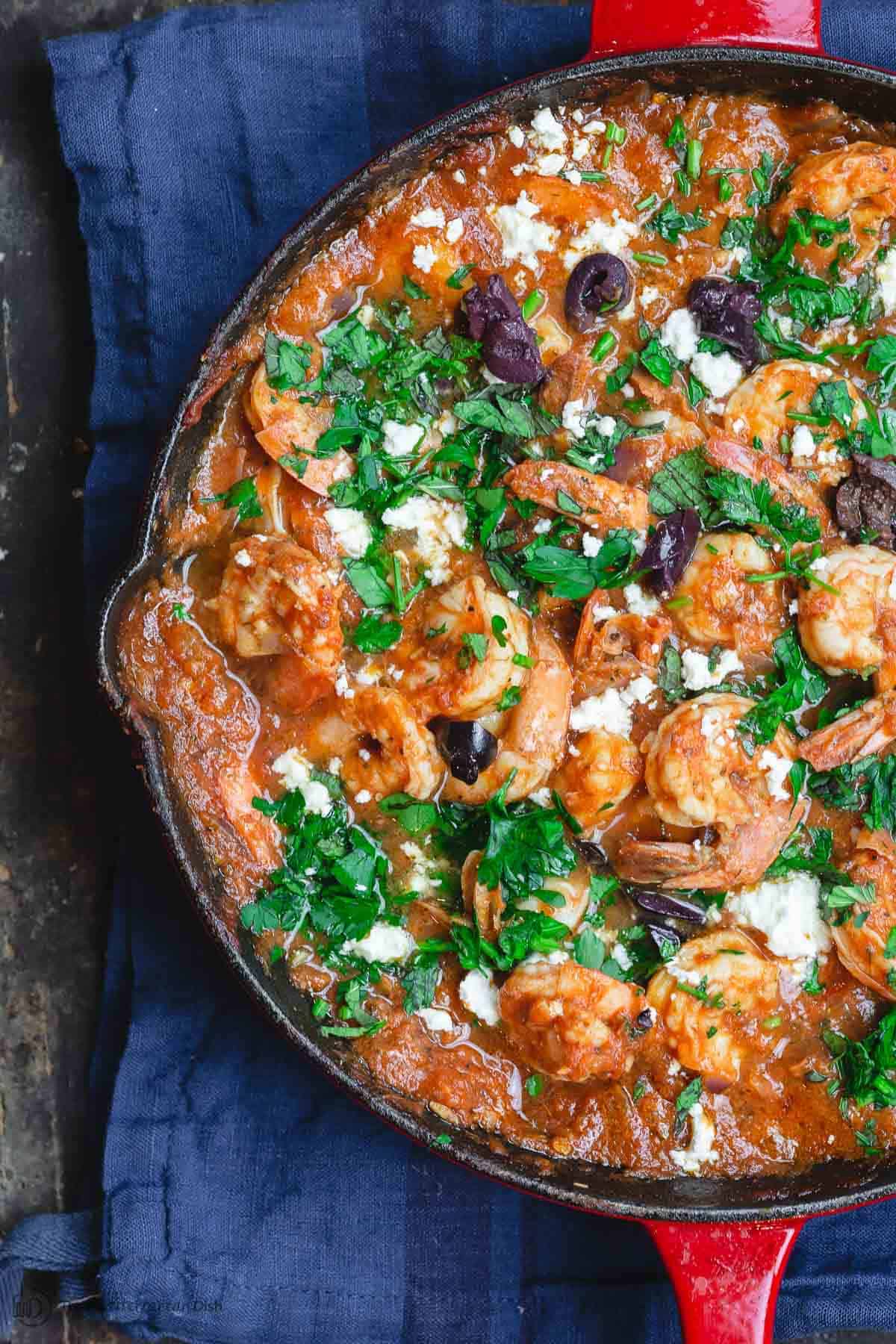
Tips for cooking juicy shrimp
Hey, shrimp can overcook in the time it takes to fill a glass of water. When that happens it becomes tough and rubbery.
Here are a couple things to look for if you want juicy shrimp:
- Shrimp is cooked when it turns from translucent gray to opaque pink.
- Remove shrimp from the heat the moment it is all pink. Its internal temperature will continue to rise a bit as it sits.
- Texture-wise, cooked shrimp should be slightly firm and give you just a bit of resistance when you bite into it.
What to serve with it
I love to serve this Greek shrimp in tomato sauce over a bed of plain orzo pasta. It works just as well with couscous. If you’re gluten-free try it with Greek lemon rice.
If nothing else, grab your favorite crusty bread to sop up all the delicious sauce, perhaps with a traditional Greek salad on the side.
For another easy Greek-inspired seafood dish, be sure to check out this psari plaki (baked greek fish). If you haven’t cooked fish very often, this is a great place to start!
How to store and reheat leftovers
Store leftover shrimp saganaki in the fridge in an airtight container. It will keep well for 2 to 3 days.
It tastes good even at room temperature, but if you need to heat it, use medium heat just to warm through (avoid heating for too long or shrimp will turn rubbery).
More shrimp recipes
Fish and Seafood
Easy Shrimp Scampi Recipe
Fish and Seafood
Grilled Garlic-Parmesan Shrimp (10-Mins)
Fish and Seafood
20-Minute Shrimp Fra Diavolo
Fish and Seafood
10-Minute Shrimp Lettuce Wraps Recipe
Browse all Mediterranean recipes.
Visit Our Shop.
Shrimp Saganaki (Greek Shrimp Recipe with Tomato and Feta)

Ingredients
- 1 1/2 pounds jumbo shrimp, 21/25, fully thawed, peeled and deveined
- Kosher salt
- Black pepper
- 1 1/2 teaspoons dry oregano, divided
- 1 1/2 teaspoons dry dill weed, divided
- Pinch red pepper flakes
- 6 garlic cloves, minced, divided
- Extra virgin olive oil, I used Early Harvest Greek EVOO
- 1 large red onion, chopped
- 1 26- ounce can diced tomato, drain only some of the liquid
- Juice of 1/2 lemon, more for later if you like
- Chopped fresh mint leaves, a generous handful
- Chopped fresh parsley leaves, a generous handful
- 2 ounces Greek feta cheese, more if you like
- 6 pitted Kalamata olives, chopped (optional)
Instructions
- Pat shrimp dry and place in a large bowl. Season with kosher salt, pepper, 1/2 tsp dry oregano, 1/2 tsp dry dill weed, pinch red pepper flakes, and about 1/2 tsp of minced garlic. Drizzle with extra virgin olive oil, and toss to combine. Set aside for now.
- In a large heavy skillet (I used this cast iron skillet), heat about 2 tbsp extra virgin olive oil over medium heat until shimmering but not smoking. Add the chopped onion and remaining minced garlic, cook briefly until fragrant (stir regularly.) Add tomatoes and lemon juice, and season with pinch of salt, pepper, and remaining dry oregano and dill. Bring to a boil, then lower heat to medium-low and let simmer for 15 minutes.
- Add the marinated shrimp. Cook for 5 to 7 minutes or until pink; do a little stirring if needed. (Do not overcook shrimp.)
- Stir in fresh mint and parsley leaves. Finish with a sprinkle of feta and Kalamata olives. If you like, add a splash of lemon juice or more red pepper flakes to your taste.
- Serve over plain orzo, your favorite grain, or your favorite crusty bread to sop up the delicious sauce. Enjoy!
Video
Notes
- Tip for juicy shrimp: The most important thing here is not to overcook the shrimp. Shrimp will start off translucent, gray, and a bit flimsy. They are done when they turn completely opaque and pink in color with bright-red tails.
- What to serve with Greek shrimp? If you’ve prepared orzo or your favorite grain as a bed for this saucy shrimp, you can also prepare a traditional Greek salad and some classic hummus as starters to your meal.
- Storage tip: Leftovers should be stored in tight-lid glass containers and refrigerated. If properly stored in the fridge, this shrimp will keep well for 2 to 3 days. It will taste good even at room temperature. If you need to reheat it, use medium heat just to warm through (avoid heating for too long, or shrimp will turn rubbery.)
- Visit our Shop to browse quality Mediterranean ingredients including extra virgin olive oils, organic spices, and more.
Nutrition
*This recipe has recently been updated with new information for readers’ benefit.



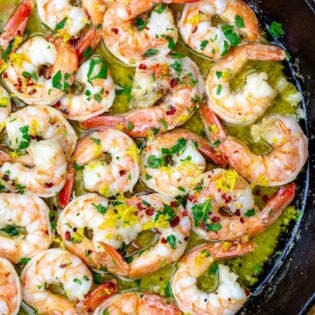



I will make this again. It was easy and the flavors were amazing!!
This was an amazing dish that I will make again and again. The fresh mint makes this dish so never skip that!
Excellent!! Served over Israeli couscous and with a Greek salad. Delish!!
Quick and easy. Very satisfying! We had it over Orzo. Will be making it again.
Thanks, Marie!
Were you using a portable induction unit underneath the pan in your video?
Hi, Joseph. Yes, Suzy was using a portable unit to cook the dish in the video.
Love love love this recipe! Perfect for a quick meal after a hot summer day.
Oh wow! So tasty! So quick! So easy! Can’t miss with this one.
I had to do some subs: fresh tomatoes and herbs instead of dried, and I didn’t have any mint. Next time……and there will be many ‘next times’ for this recipe.
Served over rice and had a starter salad.
Thanks for all your wonderful recipes!
Thanks for sharing, Eva! So glad you enjoyed the recipe!
Like every other recipe I have tried from your site, this was AMAZING!
Such incredible flavor, the perfect balance of everything. Although I couldn’t quite picture eating it over plain orzo, that is exactly what I did and it could not have been more delicious. Adding this to my list of meals to serve when entertaining!
Wonderful! Thanks, Julie!
Can you tell me serving size? Trying to apply nutritional information into a diet plan.
Hi, Rebecca. This particular recipe can be divided by 8 to get the approximate “serving size”. The nutrition info here is our best effort and we use a program that calculates that for us based on the ingredient list. The exact serving size measurement (by grams, cups, etc) is another layer that’s harder for us to precisely calculate at the moment, but we’re working on it!
I followed the recipe absent the garlic. Every plate at the dinner table was completely clean. I served the dish with homemade artisan bread and a garden salad. Super easy to make. A+
This was awesome!!! Definitely one to make again and again 🤗
Sadly no leftovers…it was gobbled up👌
I would like to try this and other recipies but I need to scale them for one or two
Hi I do that as well. when you are on the print screen there is a box that says how many servings. There is a choice to decrease or increase the number. I just did it with this recipe and worked great.
Seems besides fantastic recipes they think of practical issues too. win-win.